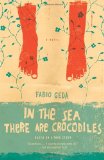Book Club Discussion Questions
In a book club? Subscribe to our Book Club Newsletter and get our best book club books of 2025!
For supplemental discussion material see our Beyond the Book article, The Persecution of the Hazara People and our BookBrowse Review of In the Sea There are Crocodiles.
Please be aware that this discussion guide will contain spoilers!
- The novel is narrated by someone recalling their childhood experiences. How does this affect your reading of the story? Do you feel more or less sympathetic than if it had been in the present tense? Do you always believe the narrator?
- Does knowing that this is a true story affect the way you read the novel? Are Enaiatollah's questions of Fabio
throughout the novel meant to remind you that this is true?
- There are very few female characters encountered in the novel - why do you think this is?
- Overall, do you find Enaiatollah's story uplifting or heartbreaking? Is any of it hard to comprehend? Which sections affected you most?
- If Enaiatollah's story had been published as a non-fiction memoir, do you think your opinion of the story would be different? Would you have approached it differently?
- Discuss the contrast of the childhood innocence of playing buzul-bazi and the Taliban arriving to close the school. Does the fact that this is a child's experience of such brutality make it more shocking?
- Despite the novel being split into sections named after the countries Enaiatollah has lived in - he says that he "doesn't want to talk about places. They aren't important." If place and belonging mean nothing to
Enaiatollah, what do you think drives him and his journeys? Is it freedom, friendship, safety?
- Discuss Enaiatollah's ideas about time - maybe consider the episode with his first watch and the fact that he doesn't know his true birthday.
- Fabio questions Enaiatollah on his mixture of similes: "It's funny. Sometimes you say things like 'he was as tall as a goat.' At other times, when you make comparisons, you come up with McDonalds, or baseball." "Why is that funny?" "Because they belong to different cultures, different worlds." Why do you think Enaiatollah does this?
Unless otherwise stated, this discussion guide is reprinted with the permission of Anchor Books.
Any page references refer to a USA edition of the book, usually the trade paperback version, and may vary in other editions.
